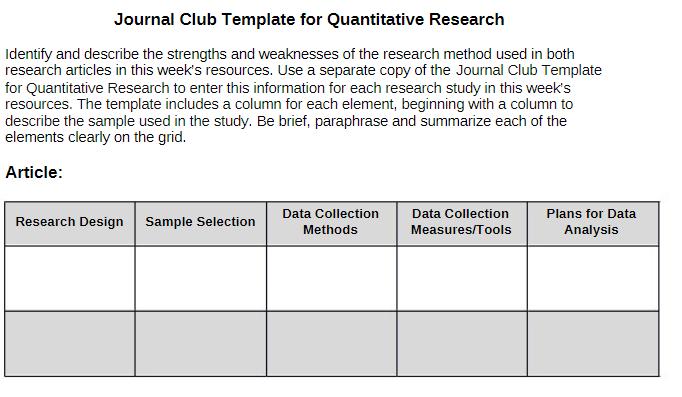Question
As you have explored this week, there are various methods a researcher may use to engage in quantitative research design. While the methods presented this
As you have explored this week, there are various methods a researcher may use to engage in quantitative research design. While the methods presented this week are not exhaustive, they do introduce numerous features that you will likely encounter when reviewing, accessing, and researching the nursing practice literature. Whether you are creating new research or searching the literature to add support for a research question you are interested in, understanding the quantitative research designs that may be used for nursing practice will likely inform how you will conduct research for your health care setting. As you continue to build upon your research skills as a nursing researcher and professional, understanding how to engage in quantitative research design is a valuable asset.
For this Assignment, view this week’s Quantitative Research Design PowerPoint webinar and pay close attention to its content on the basic elements of research methods (e.g., sample, data collection, measurement, analysis). Then, be sure to review the two research studies by Sand-Jekline and Sherman (2014) and Steelman, Graling, and Perkhounkova (2013), included in this week’s resources.
Sand-Jecklin, K., & Sherman, J. (2014). A quantitative assessment of patient and nursing outcomes of bedside nursing report implementation. Journal of Clinical Nursing, 23(19/20), 2854–2863.
Retrieved from the Walden Library databases.
Steelman, V. M., Graling, P. R., & Perkhounkova, Y. (2013). Priority patient safety issues identified by perioperative nurses. AORN Journal, 97(4), 402–418.
Retrieved from the Walden Library databases
Note: While not a required resource, you might find the definitions in the Encyclopedia of Nursing Research helpful for this assignment.
This assignment involves identifying and describing the strengths and weaknesses of the research method used in both the Sand-Jekline and Sherman (2014) and Steelman, Graling, and Perkhounkova (2013) research articles in this week’s resources. Use a separate copy of the Journal Club Template for Quantitative Research to enter this information for each research study in this week’s resources. The template includes a column for each element, beginning with a column to describe the sample used in the study. Be brief, paraphrase and summarize each of the elements clearly on the grid.
Note: You will be submitting two Journal Club Templates for Quantitative Research for this Assignment; one for the Sand-Jekline and Sherman (2014) article and one for the Steelman, Graling, and Perkhounkova (2013) article.

Journal Club Template for Quantitative Research Identify and describe the strengths and weaknesses of the research method used in both research articles in this week's resources. Use a separate copy of the Journal Club Template for Quantitative Research to enter this information for each research study in this week's resources. The template includes a column for each element, beginning with a column to describe the sample used in the study. Be brief, paraphrase and summarize each of the elements clearly on the grid. Article: Data Collection Data Collection Plans for Data Research Design Sample Selection Methods Measures/Tools Analysis
Step by Step Solution
3.42 Rating (155 Votes )
There are 3 Steps involved in it
Step: 1
Quantitative research is a very systematic empirical investigation of observable phenomenon via computational mathematical or statistical techniques Data in quantitative research is collected through ...
Get Instant Access to Expert-Tailored Solutions
See step-by-step solutions with expert insights and AI powered tools for academic success
Step: 2

Step: 3

Ace Your Homework with AI
Get the answers you need in no time with our AI-driven, step-by-step assistance
Get Started


